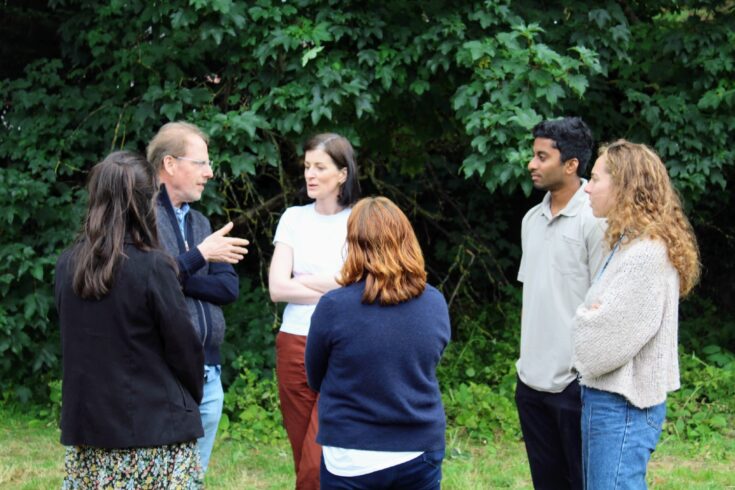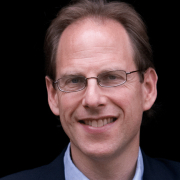My sister Suzie, who passed away in 2014, was born with both physical and learning disabilities.
Growing up with a close family member who was developing differently, behaved very differently and processed the world very differently, undoubtedly influenced my choice of working in the field of disability. I keep her in mind all the time and she influences my research on a daily basis.
Early inspirations
After studying human sciences at Oxford, I worked for a year in a school for autistic kids. There were just six children and six teachers, so it was a small, experimental school. There were video cameras on every wall of the classrooms. June Felton, the pioneering headteacher, wanted to capture the interactions between teachers and children, so that each day we could analyse the recordings to see what had worked and what had not.
I was the school bus driver, the cook, the teacher, whatever was needed. At the end of that wonderful year, I decided to do a PhD, and joined the Medical Research Council (MRC) Cognitive Development Unit at University College London.
I got the opportunity to work with the leading researcher in autism at that time, Professor Uta Frith, who taught me about the excitement of science. We designed an experiment that tested if autistic children had specific challenges with ‘theory of mind’, or imagining another person’s thoughts and feelings. We found this was the case, and argued this was relevant to understanding why autistic people struggle with social relationships and communication.
Understanding autism
When I started my research career, autism was mostly studied in children. But of course, autistic children grow up into autistic teenagers and adults. The early work in ‘theory of mind’ was extended into studying autistic adults, to show that even they have degrees of what I called ‘mindblindness’. This is difficulties in imagining one’s own or another person’s thoughts and feelings.
Over the years, my multidisciplinary research group in Cambridge has focused across the lifespan of autistic people to understand autistic people’s needs from multiple levels. Through our research, and that of others, we’ve become aware that alarmingly, most autistic adults have poor mental health. Up to 80% of autistic adults suffer from anxiety or depression. Young children born with autism are not born with poor mental health, so it’s likely poor mental health is secondary to them not receiving the right support.
Working together across disciplines to find a cause
I have a passion for basic science and putting the pieces of the puzzle together. In my research group we study autism from the molecular level through to the brain and behaviour. And we go beyond the psychology of autism to clinically relevant applications of the research, and its translation into society. The team includes biologists, epidemiologists, psychologists, geneticists, neuroscientists, and clinical scientists. They learn each other’s ‘language’ and meet together to make connections across these different levels.
Autism starts prenatally and is partly genetic, but not 100%. For decades we had no idea what other factors might contribute to the cause of autism. Over the past 20 years we have made two big discoveries which have helped us understand what causes autism.
First, we found elevated levels of prenatal androgens (sex hormones such as testosterone) in pregnancies that later resulted in autism. Second, we found that prenatal oestrogens (another group of sex hormones which are synthesised from androgens) levels were also elevated in pregnancies resulting in autism. These discoveries were a moment that was very special for me.
Lack of support in our society
One of my earliest MRC grants, in 1996, was to investigate if autism could be diagnosed in babies as young as 18 months old, and we showed that it can. Ideally, an early diagnosis should lead to the right support, so that a child has the best opportunity to fulfill their potential.
But the reality is that a lot of autistic people do not receive their diagnosis in early childhood. In fact, many are not diagnosed until late childhood, or even adulthood. This means they’re left unsupported and feeling different, but with no explanation.
As a result, they can end up feeling like they don’t fit in, and may experience exclusion or bullying by their peer group. They can feel ashamed when they’re not coping in a mainstream classroom. And the reason they’re struggling is because the mainstream educational setting was designed for non-autistic people. This can lead to a gradual deterioration in their mental health.
Many underachieve academically and sadly only 15% of autistic adults are employed. Most worryingly, one in four autistic adults have planned or attempted suicide. This paints a picture of how autistic people are being failed by our society.
Raising awareness of the reality
In 2017 I was invited by the United Nations to give a lecture on Autism Awareness Day, now called Autism Acceptance Day. I described how autistic people are excluded from many basic human rights. These include the right to education, the right to health services, the right to dignity, and the right to employment.
It was a strong point to make, especially in the very building where the Universal Declaration for Human Rights was drawn up. I was aware I was making a provocative claim. But with such elevated suicide rates and poor mental health among autistic people, I felt I couldn’t whitewash the reality.
Science for social change
All around us we were seeing autistic people receiving their diagnosis way too late, and often with very little support after the diagnosis. I had been lobbying the local NHS Trust and the Department of Health and Social Care for years for more funding for support services, but nothing was changing. Waiting lists to get a diagnosis were unacceptably long.
In an effort to change this, we created a charity called the Autism Centre of Excellence (ACE) at Cambridge, working in partnership with our research group. The charity is science-led and aims to put the science into the hands of policymakers, so there’s no delay in translating policy-relevant findings. It’s a good illustration of how my research group always has one eye beyond the lab, on the relevance of research to wider society.
The beauty of thinking differently
Autism is an example of neurodiversity. Autistic individuals’ brains develop differently, right from before they’re born. Some of these differences result in disability, for example, in social skills and communication. But others result in strengths or talents. For example, many autistic people have excellent memory for facts and excellent attention to detail. And many are strongly attracted to patterns.
My recent book, ‘The Pattern Seekers’, celebrates autistic people’s different minds. In many environments, such skills are assets. In our research group, we employ neurodivergent individuals and they enrich our work.
My advice to others is to have the courage to work on something that is outside the consensus. Science is often about ‘challenging the status quo’. Just as in many walks of life, in science we need people who can think in all kinds of ways, because that is what leads to true innovation.
Find out more
Please visit the Autism Research Centre (ARC) in Cambridge website for more information.
Also please visit the website of the charity they work with, ACE at Cambridge.
Career in brief
Sir Simon Baron-Cohen’s career history:
- received his PhD in Psychology at University College London in 1985
- received his MPhil in Clinical Psychology at Kings College London in 1987
- established the ARC in Cambridge in 1997 and now serves as ARC’s Director
- created the first UK clinic for adults seeking a diagnosis of Asperger Syndrome (now simply called autism) in 1999, which has helped over 1,000 patients to have their disability and neurodivergence recognised
- has published over 750 peer reviewed scientific articles, which have made contributions to many aspects of autism research
- delivered the keynote address to the United Nations in New York on Autism Awareness Day 2017 on the topic of autism and human rights
- received a knighthood in the 2021 New Year’s Honours list for his services to autism




